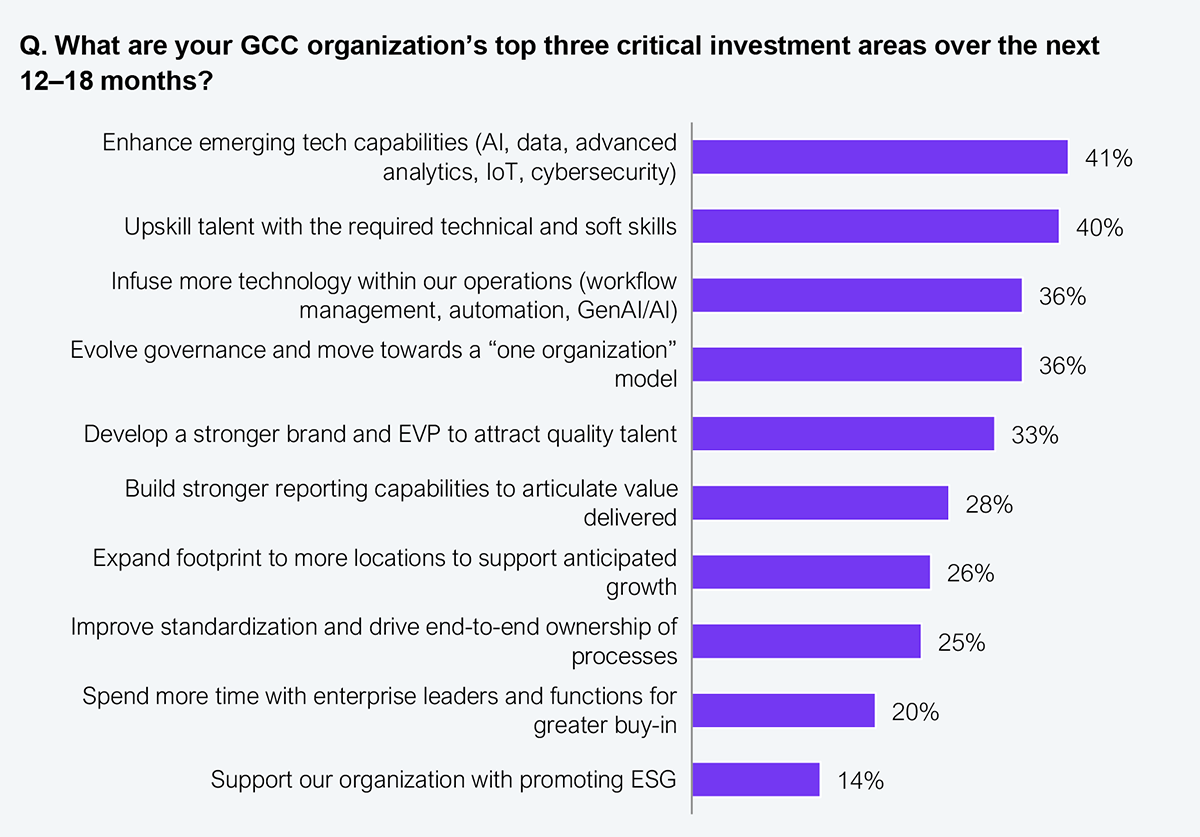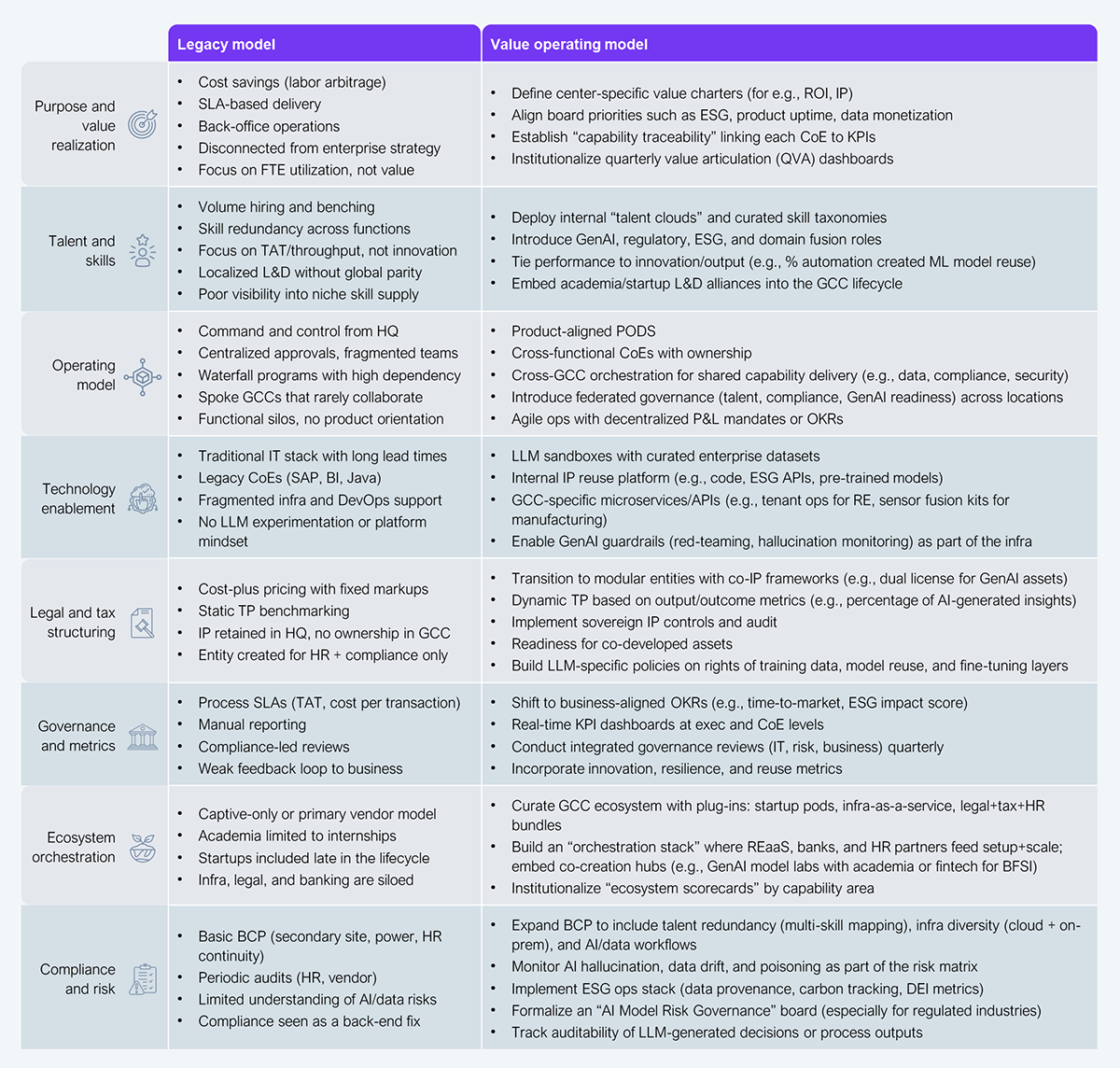Enterprise leaders are finally confronting the uncomfortable truth: the legacy Global Capability Center (GCC) model built on full-time employee (FTE) headcount is obsolete. In a world dominated by GenAI, autonomous operations, and continuous risk exposure, funding GCCs without a tangible value charter tied to outcomes is not just wasteful but strategically reckless. The solution: pivot GCCs from cost centers to value operating models, focused on embedding AI capabilities, creating reusable IP, and aligning with core enterprise metrics such as ESG outcomes, compliance traceability, and speed-to-market.
But the window to get this right is closing fast. GCCs must now become hubs for capability reuse and digital scale, or risk becoming irrelevant in the enterprise transformation story. Over 40% of the GCC leaders we surveyed have already prioritized AI, data, and cybersecurity as their top investment areas over the next 12–18 months (see Exhibit 1), signaling a clear shift from capacity to capability. These centers are not just supporting back-office tasks; they’re now core to innovation pipelines, regulatory compliance, and digital operating models.

Sample: 198 Forbes Global 2000 enterprise leaders
Source: HFS Pulse, 2025
However, most enterprises still support these centers using outdated metrics such as cost per FTE or SLA compliance. If you’re not tying GCC performance to the reuse of ML models, code libraries, or ESG APIs, you’re not measuring the right value.
We have outlined eight dimensions (see Exhibit 2) in which the value operating model challenges legacy norms, ranging from modular legal structures with co-IP ownership to LLM-specific guardrails that monitor hallucinations and model drift. These risks can’t be outsourced anymore.
Moving away from legacy systems, most GCCs are increasingly leveraging AI and machine learning technologies through the value operating model—focused on upskilling talent, tech enablement, legal, tax, and compliance with evolved business continuity plans. Reflecting this shift, Evergent, an end-to-end monetization platform, named its GCC “Global Value Center (GVC)” when it opened in Hyderabad in June 2025. Additionally, many new GCCs are focusing on domain-specific services powered by AI and ML. For instance, AML Rightsource plans to provide solutions for anti-money laundering and financial crime compliance, enhancing its overall service offering.

Source: HFS Research, August 2025
GCCs are killing the centralized command-and-control model. Enterprises are replacing waterfall silos with POD teams, agile squads, and cross-functional CoEs. These teams are not only closer to the customer but also to decision-making. By adopting these strategies, GCCs such as Deloitte’s (recently launched the Global AI Simulation Centre of Excellence in India) can drive significant value and sustain growth in a complex business environment, leveraging next-generation technologies such as 5G, IoT, and robotics.
According to HFS Research, 16 new GCCs (including AML Rightsource, Evergent, Global Foundries, Entain, eBay and Heineken, etc.) were launched in India during Q2 2025, with most adopting value-based operating models. DBS Bank, for instance, has established POD teams to drive customer segment innovation through AI-driven demand assessments, loan evaluations, and fraud detection. Siemens Energy embeds AI into manufacturing lines for real-time quality control and defect detection. Amazon employs AI agents for inventory management and demand forecasting.
Modern GCCs are replacing legacy IT stacks with advanced technology enablers such as LLM sandboxes, curated datasets, microservices, and APIs, ensuring experimentation and reuse of digital assets. For instance, Mastercard (India technology hub) operates AI Garage in India with “Sandbox as a Service” to accelerate experimentation with third parties to generate new ideas and turn them into executable solutions.
The newest GCCs aren’t bloated factories. They’re surgical teams, with typically 150–200 people focused 70% on digital and emerging tech. Take Walmart Global Tech India, which is hiring for AI agents and cybersecurity engineers to drive supply chain resilience and customer experience at scale. Such efforts highlight innovations in India, particularly in supply chain and customer experience, embodying the “build once, reuse globally” value enabler concept.
Those leading in this space are already prioritizing the value operating model. They’re tapping talent clouds, conducting innovative experiments, such as detecting data drifts and monitoring for AI hallucinations, and enhancing business continuity plans. Shift to value creation now or risk getting left behind in your transformation agenda.
Register now for immediate access of HFS' research, data and forward looking trends.
Get StartedIf you don't have an account, Register here |
Register now for immediate access of HFS' research, data and forward looking trends.
Get Started